Interview with Fiona McIntosh
From the relative cool of a shady spot on the De Lasset estate I observe the May rose harvest of Grasse. It’s the time of the Great War and with all the men away it’s women, wearing simple cotton skirts and shirts, who are bent over the sea of pink blooms, plucking and filling their sacks with petals that will form the heart of Grasse perfume. Among them is Fleurette, her slender form and elegance noticeable even from this distance. I feel a twinge of guilt at not helping with the harvest, but I’m here for a different reason. Tea has been laid out in honor of my special guest and creator of the story contained within this wonderful vista, multi-talented Australian writer Fiona McIntosh.
RH: Fiona McIntosh, welcome to your very own Grasse inspired fields at Writers Block! I’ve tried to recreate the sights and scents evoked so beautifully in your latest novel The Perfumer’s Secret. Hopefully, I’ve done your book justice. It’s such a beautiful day that I thought we could sit in the shade and share a pot of Russian Caravan while we chat. And because I can, I’ve smuggled in some Swiss pralines. Would you care for a cup?
FM: Yes please and in your Limoges porcelain its flavour might taste even more exquisitely delicate. Incidentally, that smokiness on the palate is believed to have intensified due to the tea taking on moisture when it was unloaded onto the snow at night during its alternate route through Odessa. The ancient route was via colder, drier Mongolia.
RH: Ah, I thought it tasted better. I’d assumed it was the Limoges…Madame Mouflard crossed herself when Fleurette said we were to use it!
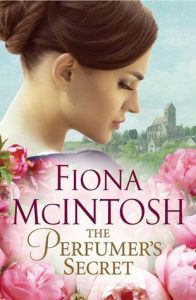 The Perfumer’s Secret
The Perfumer’s Secret
RH: Thanks to you and your lovely publicist at PenguinRandomHouse Australia I’ve been privileged to read an advance copy. I loved it! It was delightful to escape into the story and I found myself looking forward to the end of the day so I could be transported. I’m not the only one. Your historical novels have been described as “gripping, emotional and totally wonderful”, “cinematic” and “full of drama and romance”; “Wonderful storyteller” is a prevalent phrase in all of your reviews, which consistently rate five stars. In historical romance The Perfumer’s Secret would be one of my favourites. Tell us a little about the story and why you chose to set it at the time of The Great War.
FM: Thank you for that generous intro. All stories are close to the hearts of their writers but I have learned to let each one go as soon as I move into the next. However, this one lingered because of its particularly sensuous quality that wafts up from the glorious theme of flowers weaving its way through the story but also the recurring focus on smell. I have always enjoyed employing smells to trigger the readers’ imaginations because scent and memory are so closely entwined. A single whiff of our mother’s or grandmother’s perfume for instance can transport us all back to childhood and deliver us vivid recollections.
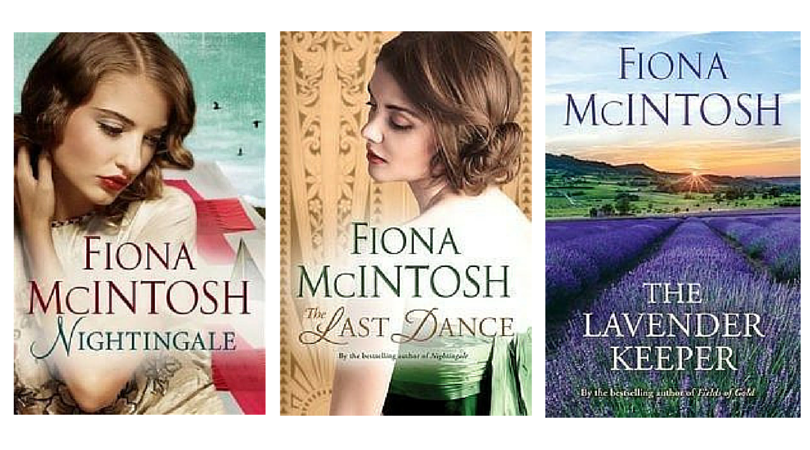 The Perfumer’s Secret genuinely grew out of The Lavender Keeper and its sequel The French Promise. Readers urged me for a third book. If there was to be a third volume I figured the story would most logically focus on the characters no longer being growers of the flowers but perfumers using the essential oil. I took a long hard look at this option and I came up wanting because if we’d followed the characters I would have found myself trapped in the 1970s. This is not an era I relish storytelling within because it’s too recent. My preference and fascination is for the era in the years leading up to and between the two world wars. Nevertheless, I did want to write a story about perfume and so I simply looked back to the gloriously innocent era of perfume prior to the explosive arrival of Chanel No.5 onto the world stage in the early 1920s and I dipped my nib into that time you could say.
The Perfumer’s Secret genuinely grew out of The Lavender Keeper and its sequel The French Promise. Readers urged me for a third book. If there was to be a third volume I figured the story would most logically focus on the characters no longer being growers of the flowers but perfumers using the essential oil. I took a long hard look at this option and I came up wanting because if we’d followed the characters I would have found myself trapped in the 1970s. This is not an era I relish storytelling within because it’s too recent. My preference and fascination is for the era in the years leading up to and between the two world wars. Nevertheless, I did want to write a story about perfume and so I simply looked back to the gloriously innocent era of perfume prior to the explosive arrival of Chanel No.5 onto the world stage in the early 1920s and I dipped my nib into that time you could say.
Wars had been fought but no one had ever experienced anything like World War One previously with its advent of killing machinery, poisoned gas, death on such a mammoth scale – it was supposedly a war to end all wars and France was consumed by it. Everything for the novel was perfect located in southern France at the beginning of the Great War. This was a time when women existed in a man’s world and a gifted, ambitious, free-thinking woman was not applauded. She wasn’t even encouraged. Fleurette Delacroix embodies the pioneering and spirited women at the turn of the previous century who found the courage to stand up for their right to dream, to want more out of life than to be pretty ornaments for men and the bearer of children.
Her gift of smell makes her almost dangerous in an industry entirely ruled by men. To be honest that’s what I thought I was writing about when I set out on the journey of this novel – a wealthy woman fighting to be accepted for her unrivalled talent in an era when all she should care about was making the right marriage. Instead, my curious way of writing to no plan allowed the characters to take the story into a realm I didn’t forsee and ultimately it became a story about powerful families at war; it hinges on a terrible secret from a previous generation that reaches out to potentially destroy the new generation and how Fleurette is enmeshed into steering both families through the upheaval and catastrophe of one of Europe’s darkest times but also her family’s darkest hours. It is set entirely in France in the city of Grasse, the perfume capital of the world.
The Changing Role of Women
RH: As you’ve mentioned, Fleurette is expected to make the right marriage, and we first meet her in a carriage on her way to her wedding. Unfortunately it’s not a happy day for her. Not only is she being forced to marry a man she doesn’t love, her marriage marks the end of her dreams of using her gift—her heightened sense of smell. The feminist thread running through Fleurette’s frustrations at the role she is forced to play merely because of her sex never overwhelms the story. And though it’s set a century ago, I certainly felt connected to her frustrations. Share with us why it was important to include the state of women at this time in history. Was this a conscious decision to include this subtext or is it impossible to write about that time without including the changing role of women?
FM: Not a conscious decision, no, but I couldn’t possibly write a story with a mimsy, swooning lead female. In all of my stories the women must demonstrate strength and resilience, or I would bore of them fast. So yes, in this regard, I suppose I consciously develop female characters to admire as I write, even though I often put them into dire situations. I never know how they’re going to cope; I just hope they’ll find a way through.
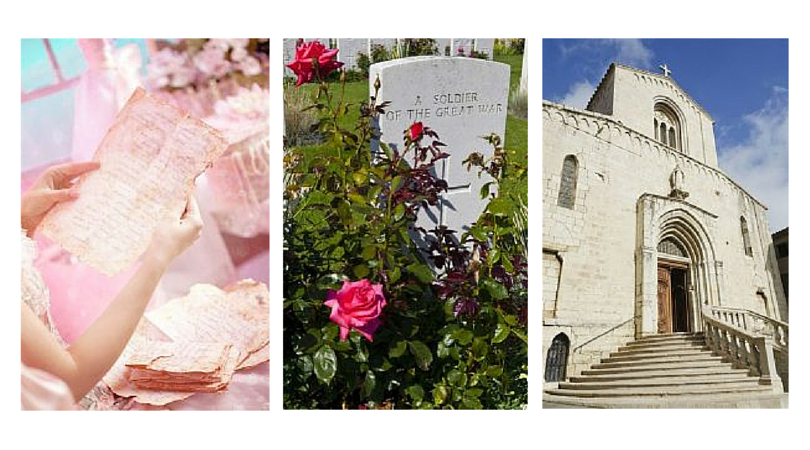 All of that said, you’re right, I find it impossible to write my stories in this tumultuous era of change without referencing women’s changing roles. There was no change more dramatic than the role of women through WWI; how it shaped their immediate future and for generations down the decades. I don’t consider myself a feminist in a political sense but I have enormous faith in women because they ARE mothers. In the era I write women had to adapt so fast and even though they were living through an age when their opinions didn’t necessarily count, they had no vote, they had few rights, they were essentially the property of their fathers and then husbands, they also kept the countries going while men fought it out at the various fronts. I’m speaking for all women now, no matter which side their men were fighting on.
All of that said, you’re right, I find it impossible to write my stories in this tumultuous era of change without referencing women’s changing roles. There was no change more dramatic than the role of women through WWI; how it shaped their immediate future and for generations down the decades. I don’t consider myself a feminist in a political sense but I have enormous faith in women because they ARE mothers. In the era I write women had to adapt so fast and even though they were living through an age when their opinions didn’t necessarily count, they had no vote, they had few rights, they were essentially the property of their fathers and then husbands, they also kept the countries going while men fought it out at the various fronts. I’m speaking for all women now, no matter which side their men were fighting on.
It makes it interesting to observe them understanding and then grasping the need to take control, to watch the sense of confidence and ultimately power settle around them. I too felt connected to Fleurette’s frustrations and I’m glad to hear that you didn’t feel a feminist thread overwhelming the novel because I insist my stories have no agenda other than to entertain.
Choosing Point of View
RH: I wanted to ask you about point of view. All the Fiona McIntosh novels I’ve read previously have been written in third person, often from multiple perspectives. The Perfumer’s Secret is written entirely from Fleurette’s point of view. I didn’t really notice until Sebastien arrived on the scene—wounded and bearing missives that will change Fleurette’s life—and I realized I was getting to know him only through Fleurette’s impressions. It’s often claimed that first person is difficult to write because it places limits on how the story can be revealed. Is this the first time you’ve written a novel in first person? Share with us a little about why you chose that point of view and whether (or how) it impacted on your writing of the The Perfumer’s Secret. For example, did it give rise to obstacles or was it a liberating experience?
FM: Oddly I didn’t choose it. I would never choose to write in first person because it is so damn hard! Unless you’re going to have several first person points of view, which risks feeling clumsy to a reader if one’s skill isn’t up to it, generally you can’t be anywhere else but in the head of your single character; you can’t join anyone else, you can’t share anyone else’s thoughts. Grrrr, it was like prison and yet I had no choice.
Fleurette’s voice came to me from day one on this novel and I can recall writing to my editor, feeling horrified and also worried. I didn’t want to write first person pov – I have always enjoyed the omnipotence of running with a host of characters and knowing each one’s motivation, sharing that with my readers. But my lead character demanded this. I just fell helplessly into first person and it terrified me because I knew what I was letting myself in for – after 29 previous books, I couldn’t fail to know the traps awaiting me. And I’d never done this previously, I wasn’t sure I was competent to handle it. Nevertheless, my editor urged me to go with my instinct. And Fleurette didn’t let me down; she filled me with oodles of story and I didn’t need to inhabit anyone else. Her voice, though sometimes anxious was strong from page one and kept gaining in confidence and so I trusted her and I was thrilled to experience her growing into her ‘power’.
It’s a supremely intimate experience to walk inside one character and see the story unfolding only through that person’s experiences and perspective and I enjoyed every minute of it and yet the next book I have, without any conscious decision, fallen straight back into third person. I miss the intimacy I’ll admit but I also want to understand what makes my other characters tick in this new book. I don’t think it will be the last time I write in first person and I came very close to it, to be honest, with The Last Dance that, while it was third person it might as well have been first for the book moved entirely on the shoulders of Stella. I think Stella encouraged me and then Fleurette dared me! J Will I write again in first person? I’m sure I will.
Researching Perfume Making
RH: Besides the escapism of a sweeping historical romance I loved all the insight into the making of perfume, particularly Fleurette’s depiction of scent; you use fragrance to show her moods or lead her into a memory. And you didn’t stop there. You’ve penned a companion book, On The Scent of Perfume, which is about your research for the novel, and even created a perfume. It smells divine and very evocative of perfumes of that era. Tell us a little about researching The Perfumer’s Secret and how the idea for developing your own perfume came about. Which came first Fleurette’s story or the development of your perfume? And I have to ask, will you be selling the perfume commercially?
FM: The making of perfume intrigued me from 2008 researching The Lavender Keeper. And then when the research began on The Perfumer’s Secret I realised if I had my time again I think I would be a perfumer. Everything about it fascinates me especially in the old days of perfume when the original source was found in Nature.
Today, much of the perfume we spray on ourselves is crafted with products we’ve created i.e. test tube vanilla. Today the genuine source is viciously expensive or impossible to get in quantity…or banned e.g. protected species. Back then making perfume was an intimate experience. It’s you and Nature working together. Your nose, your instinct, your senses, your trust and especially your confidence that you can smell whether this particular aroma from a plant works with that particular aroma from a marine source.
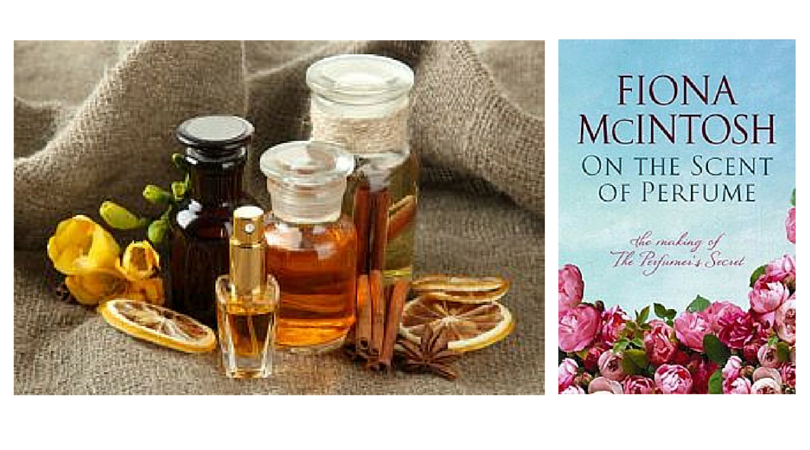 Making perfume is riddled with drama and tension…and indeed conflict. It’s like a great piece of commercial fiction because of those ingredients. It’s competitive, hugely expensive to buy in the raw product, and the suspense of adding this to that knowing the brew will irrevocably change for good or for worse is brilliant. I’ve done it and even on the tiny scale of me producing my own perfume to go with this story I was perspiring with the anxiety of wondering whether I should use geranium or tobacco, white tea or violet. I had nothing to go on but my own sense of smell. I could spend hours talking to you just about smell – some of us so much better than others. The average person can distinguish maybe 300 smells. A good ‘Nose’ in the perfume industry can distinguish 3000. Amazing! Learning about base, heart and top notes thrilled me, sitting down in front of a perfume organ with hundreds of ‘notes’ daunted me.
Making perfume is riddled with drama and tension…and indeed conflict. It’s like a great piece of commercial fiction because of those ingredients. It’s competitive, hugely expensive to buy in the raw product, and the suspense of adding this to that knowing the brew will irrevocably change for good or for worse is brilliant. I’ve done it and even on the tiny scale of me producing my own perfume to go with this story I was perspiring with the anxiety of wondering whether I should use geranium or tobacco, white tea or violet. I had nothing to go on but my own sense of smell. I could spend hours talking to you just about smell – some of us so much better than others. The average person can distinguish maybe 300 smells. A good ‘Nose’ in the perfume industry can distinguish 3000. Amazing! Learning about base, heart and top notes thrilled me, sitting down in front of a perfume organ with hundreds of ‘notes’ daunted me.
I decided to make the perfume to go with the book because it helped me to firstly understand the process that Fleurette was moving through but also to enjoy her journey in a tactile way. I insisted that we use notes that were only available in 1914 so that the integrity of the perfume is there with regard to the story. Much as I would have loved a modern scent to wear today, this one is a fraction blousy and old fashioned but it is authentic and you won’t find aldehydes in my perfume for instance, nor will you find Musk that is now banned but it wasn’t banned then and so many musk deers lost their lives for the sake of perfume. As a determined animal rights fist-shaker and vegetarian I felt I just couldn’t add musk to my perfume, even though Fleurette would have had the option.
Researching the story was immense. I went to southern France three times for this book, twice I spent two chunks of time living in Grasse and immersing myself in its world and particularly its history. This is the spiritual perfume capital of the world because it’s from here that the great houses of perfume sprang up, first around a tannery industry and then a bright spark at Galimard decided to counter the viciously bad smell of their gloves with something scented.
It is here that the famous rose fields still grow the exquisite May roses that leap deliciously from the famous Chanel No.5 that legend has it came into being as a mistake by the chemist working on the fragrance. If you walk through Grasse streets in summer, the village douses passers by with a scented vapour from overhanging atomizers to keep its tourists cool and fragrant – marvellous! I first visited various museums and perfume schools around Provence, and then visited L’Occitane headquarters, learned to make a fragrance for lotions, hand creams, then I took it more seriously and went to school to spend time with budding perfumers in Grasse and ended up at the House of Galimard twice. I talked extensively to successful perfumers, learning how they approach a new fragrance.
I did a practice perfume one year, which I called Nightingale because I was writing that book at the time and then I used all that I’d learned on the Nightingale fragrance to make Fleurette and keep faith with the book and her perfume. I read loads of books on perfume and its history – it was a joyous research experience for me and it sent me on a delicious journey down memory lane of tracking vintage perfumes from my life.
The perfume I first wore was Ma Griffe by Carven. Love it still! And last year it made a comeback I noticed in all the airports around the world. However, my great love – apart from Chanel No. 5 that makes me think of my wonderful mother and April Violets that instantly transports me into the hug of my beloved grandmother— is the perfume I discovered in 1975. Aged 15, I smelled a waft of a passing woman and was transfixed by how I responded to that fragrance and I spent weeks finding it. Finally, I sprayed Rive Gauche onto myself and I have never wanted another perfume frankly.
It is me in a bottle…not too girlie, definitely aloof, a fraction metallic and determined, with a romantic side I desperately try to keep hidden, it demands elegance, good manners. And it has notes of sandalwood (such a favourite) and narcissus and you need to take a slightly narcissistic attitude when you’re self employed *grin* Sadly Yves Saint Laurent, under Tom Ford’s artistic direction changed the recipe in the 1990s to freshen it up and it was a disaster for us purists. We revolted by moving away from it and it has never been able to capture that magic for me in its modern format although Intense – if you can find it, as I have – is a closer memory of the original.
These days, without my beloved Rive Gauche of the 1970s I return to the exquisitely pure smells from Chanel…Eau Tendre, Christian Dior etc. However, one of my sons was determined to hunt down a bottle of vintage YSL Rive Gauche perfume and he found it in America; an unopened half fluid ounce of ‘parfum’ of the 1975 original and he bought it for me. It’s like treasure and when I opened it the smell lifted me up on its immense and wild beauty and flew me back to my mid-teens, which perhaps unlike most I do remember with great fondness.
All of this emotional joy of mine in perfume is captured in The Perfumer’s Secret. It’s all about smell and the secrets of history, memory, family, love, desire, ambition.
The Masterclass
RH: Wow, that’s like a potted history of all you’ve learned! And it really brings home why smell is such an important tool for writers: as you say, it’s a way into memory and revealing character. Which brings me to your role as teacher. You run the highly successful and in-demand Masterclass workshops (which I’ve been honoured to attend) and have now added several other educational courses. Recently you released How to Write Your Blockbuster, in which you share your writing wisdom. Tell us a little about that book and how it came to be.
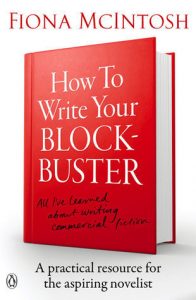 FM: I wrote How to Write Your Blockbuster as a handbook to go with the signature masterclass in commercial fiction. It was going to be something I published myself for writers who perhaps struggled to get to the masterclass. It couldn’t replace masterclass because as you discovered, Ro, there’s a special kind of magic that erupts within the group. Epiphanies occur, alongside tears and laughter and what I always think is an uplifting and inspirational sense of confidence and power that enters all of the writers in the cohort. Friendships are forged, bonds are genuinely made within the group, motivation escalates and essentially people discover themselves and their joy in storytelling. That can’t happen via the book because you need the physicality of masterclass and perhaps my terrible dancing to achieve the visceral response that we seem to achieve…but let’s not go there!
FM: I wrote How to Write Your Blockbuster as a handbook to go with the signature masterclass in commercial fiction. It was going to be something I published myself for writers who perhaps struggled to get to the masterclass. It couldn’t replace masterclass because as you discovered, Ro, there’s a special kind of magic that erupts within the group. Epiphanies occur, alongside tears and laughter and what I always think is an uplifting and inspirational sense of confidence and power that enters all of the writers in the cohort. Friendships are forged, bonds are genuinely made within the group, motivation escalates and essentially people discover themselves and their joy in storytelling. That can’t happen via the book because you need the physicality of masterclass and perhaps my terrible dancing to achieve the visceral response that we seem to achieve…but let’s not go there!
What I didn’t expect was for Penguin to have a huge desire to partner up with me on this venture and publish the book and it thus became a much bigger project. I wanted to talk to the reader in a way that they weren’t used to being addressed in help-yourself-to-write books. I insisted that it had to be practical; it couldn’t be a pile of exercises that you had to go off and do yourself. I knew the readers likely wouldn’t. So instead I piled in all the stuff that I wished someone had explained to me when I was setting out….everything from how to write to when to write. It felt important to look at the emotional side of writing as much as the physical side and then to make sure new writers do not make excuses, to show them ways to find discipline.
On the flip side I wanted to pile drive into new writers how not to allow themselves to get so hung up on the concept of writing that they forget they’ve got lives to lead. I don’t let writing define me and I refuse any of my masterclassers to become so enmeshed in their novels that family, friends, work, hobbies, lifestyle suffers. It’s not healthy and so the book takes a no nonsense attitude to writing. And I’m sure you’d probably say that the masterclass itself has a strong no nonsense way about it too.
RH: Absolutely! And the Masterclass really crystalized my goals as well as helping me view things differently. I know of a fellow reviewer who credits your book with making her start writing—something she’s always indeed to do.
FM: I’ve added a host of new courses to the line up because writers need them. Writers are by their nature dreamers but to be successful in commercial fiction you have to think ‘commercially’ and a lot of emerging writers don’t have the experience or knowledge of how to do that, how to survive, how to not become anxious or overwhelmed. I come from a highly commercial background of successful business of 35 years and I bring all of that to the workshops – we now have some brilliant professional weekends underway to equip writers for the big world of commercial publishing.
Your readers can find out more if they’re interested here: http://fionamcintoshmasterclasses.com
The Fast Five
RH: Thanks for sharing so generously with us today, Fiona. I can’t wait for everyone to enjoy The Perfumer’s Secret. Now, have another praline and a fortifying cup of Russian Caravan? Because it’s time for your…
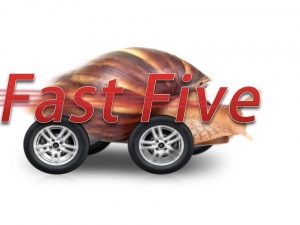 RH: What is your all-time favourite book and/or movie?
RH: What is your all-time favourite book and/or movie?
FM: Right now, I’m quietly obsessed with Cairo Time for the sexual tension and helplessly romantic characters and setting. And I have to add The Painted Veil in there too for identical reasons.
RH: What are you reading now?
FM: I’m reading a book called Hunting Evil, which is about the aftermath of WWII, and bringing the Nazis involved in the Holocaust to justice. I’m also always reading Bill Bryson to make me laugh and keep me in the light when I’m trawling through dark stuff.
RH: What is your favourite word?
FM: Serendipity
RH: What is your worst writing habit?
FM: My gunslinging writing style of no planning…but it’s the only way I know how.
RH: What is the best bit of advice you ever got (about writing or life in general)?
FM: To take risks. I have in life and also in my writing that is forever evolving and aiming to innovate.
RH: Well said! It’s always a pleasure chatting with you, Fiona. This is where I usually ask what’s next for Fiona McIntosh, but I understand you have lots on the go, and of course your Masterclass workshop series is booming. So I guess the better question is, What’s your next big project?
FM: Several big projects looming:
- Selling up in the city to live full time in the country on eight acres and renovating an old farmhouse.
- Taking the signature commercial fiction masterclass into its first overseas venue. Fingers crossed the inaugural UAE McIntosh Masterclass will be held in Dubai in early 2016.
- Hosting a group of 26 Australian and New Zealand travellers to France on what I’m calling The Perfumed Tour where we focus on flavours and scents including food, wine, cakes, nougat, honey, olives, chocolate, fruit as well as perfumes to wear and the host of smells that scent our world. Travellers can be assured they will walk in the footsteps of Fleurette Delacroix in Grasse.
- Introducing an important new professional weekend for former masterclassers to learn all about Branding and to set up my long awaited Writers Retreat that I suspect may run in the South Australia’s Clare Valley but also and especially in Tasmania.
- A new non fiction title, not about writing.
- Learning to make perfect sourdough!
- Rescuing some caged hens and ageing dairy cows.
RH: Thanks again for joining us today, Fiona—and good luck with all your new (ad)ventures!
Buy the Books
If you’d like to buy a copy of any of the books we’ve discussed click on the links below or go to Fiona McIntosh’s author page at Penguin Books Australia
The Perfumer’s Secret
Download your free eBook of On The Scent of Perfume
How To Write Your Blockbuster
About the Author
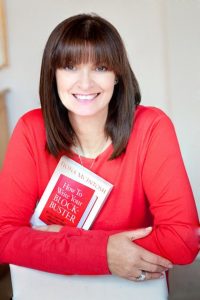 Fiona McIntosh is the author of 30 best selling commercial novels ranging across various genres including fantasy for adults and for children. But increasingly she is becoming better known for her romantic period adventures with their lush landscapes from around the world and her suspenseful, fast paced storytelling style.
Fiona McIntosh is the author of 30 best selling commercial novels ranging across various genres including fantasy for adults and for children. But increasingly she is becoming better known for her romantic period adventures with their lush landscapes from around the world and her suspenseful, fast paced storytelling style.
Read more about Fiona McIntosh
Connect with Fiona
Official Website | Facebook | Twitter
Learning Opportunities
Explore the Fiona McIntosh Masterclass workshops and her other educational ventures.
Stay in touch: Join the Community
Stay up-to-date with all the interview, novel and review news (and occasional freebies!) by joining my monthly newsletter. Register your details–it’s free and you can remove yourself at anytime.
* indicates required

Lovely interview Rowena and Fiona!
Thanks Kathryn, I was lucky to catch Fiona before her blog tour started. Sometimes timing is everything 🙂